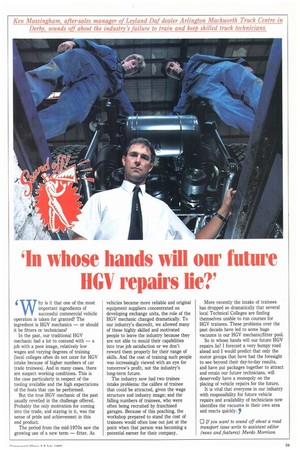'In whose hands will our future HGV repairs lie?'
Page 41

If you've noticed an error in this article please click here to report it so we can fix it.
hy is it that one of the most important ingredients of successful commercial vehicle operation is taken for granted? The ingredient is HGV mechanics — or should it be fitters or technicians?
In the past, our traditional HGV mechanic had a lot to contend with — a job with a poor image, relatively low wages and varying degrees of training (local colleges often do not cater for HGV intake because of higher numbers of car trade trainees). And in many cases, there are suspect working conditions. This is the case particularly in respect of the tooling available and the high expectations of the feats that can be performed.
But the true HGV mechanic of the past usually revelled in the challenge offered. Probably the only motivation for coming into the trade, and staying in it, was the sense of pride and achievement in this end product.
The period from the mid-1970s saw the growing use of a new term — fitter. As vehicles became more reliable and original equipment suppliers concentrated on developing exchange units, the role of the HGV mechanic changed dramatically. To our industry's discredit, we allowed many of these highly skilled and motivated people to leave the industry because they are not able to mould their capabilities into true job satisfaction or we don't reward them properly for their range of skills. And the cost of training such people was increasingly viewed with an eye for tomorrow's profit, not the industry's long-term future.
The industry now had two trainee intake problems: the calibre of trainee that could be attracted, given the wage structure and industry image; and the falling numbers Of trainees, who were often being recruited by franchised garages. Because of this poaching, the workshop prepared to stand the cost of trainees would often lose out just at the point when that person was becoming a potential earner for their company. More recently the intake of trainees has dropped so dramatically that several local Technical Colleges are finding themselves unable to run courses for HGV trainees. These problems over the past decade have led to some huge vacuums in our HGV mechanic/fitter pool.
So in whose hands will our future HGV repairs lie? I forecast a very bumpy road ahead and I would predict that only the motor groups that have had the foresight to see beyond their day-to-day results, and have put packages together to attract and retain our future technicians, will deservedly have a monopoly on the placing of vehicle repairs for the future.
It is vital that everyone in our industry with responsibility for future vehicle repairs and availability of technicians now identifies the vacuums in their own area and reacts quickly.
0 If you want to sound off about a road transport issue write to assistant editor (news and features) Murdo Morrison.
















































































